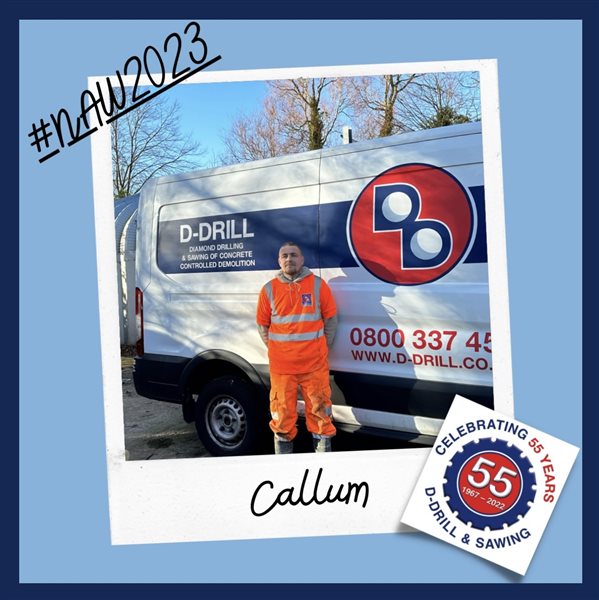
06 February 2023
National Apprenticeship Week 6th - 12th February 2023
An Apprenticeship is an excellent route to a career in the construction industry. This years National Apprenticeship Week focuses on gathering skills for life with an apprenticeship. Apprenticeships are practical work-based schemes developed by the construction industry to help plug the skills gap in the sector.
Did you know 76% of apprentices stay with their employer after they complete their apprenticeships.
At D-Drill 45% of all our work force have been or are going through an apprenticeship supported by The Drilling and Sawing Association.
Apprenticeships offer a structured training programme for an Apprentice, combining college study with on-the-job training. Apprenticeships lead to respected qualifications – NVQs and SVQs, which prove that the standards of work expected in the industry have been met, supported by work on core skills.
The DSA has developed a Drilling and Sawing Apprenticeship for our sector called the Level 2 NVQ Diploma in Specialist concrete occupations (Construction) in England and Wales and the SVQ Level 2 and 3 in Specialist Concrete Occupations for Scotland. The elements of an apprenticeship are
Training and assessment – an assessor will award the NVQ Diploma by verifying the achievements such as courses off-site and the evidence gained on site;
Work Based Evidence – gathering and recording a wide range of work experience. College training: Key Skills
Key Skills – aims to promote and recognise those skills that are essential to all jobs. Key Skills include such experience as dealing with customers and working out the cost of materials. Depending on the requirements of the Framework, apprentices work towards achieving Key Skills at level 1 or 2.
Diploma – after consultation with industry the Sector Skills Council developed the Construction Diploma, these new off- the-job training qualifications are a response to the changing needs of industry. They deliver the underpinning knowledge and understanding relevant to the S/NVQ. They are delivered by a taught programme of off-the-job training.
Employment Responsibilities and Rights – all employers and employees have responsibilities and rights under employment law, and employment can be affected by other laws as well. This key element is included in the apprentices training programme.
The Advantages of the scheme
Apprentices are benefitting businesses across the construction industry and more and more employers recognise the value of investing in training to create competent and qualified workforce for the future.
40% of contract costs are allocated to Operative labour. Testimonies from current employers of apprentices on the scheme, shows that a trained and competent operator can work more efficiently and productively which results in fewer problems on site and less damaged to equipment. (DSA 2012 Survey – Current Employers Benefits of the Scheme).
The scheme is linked to the NVQ Diploma Level 2 in Drilling and Sawing and an Apprenticeship Deed from the CITB.
There are substantial grants available from the CITB for training via this route – see PRICES
It is another factor in persuading clients that we have a professional, trained workforce, working to a code of Safe Working Practice.
Scheme is recognised by the UKCG – United Kingdom Contractors Group.
Apprentices will have access to discounts via Oyster travel cards and NUS + discount card.
Back to news